- Home
- Farley Mowat
And No Birds Sang Page 8
And No Birds Sang Read online
Page 8
The town of Grammichele was defended by two infantry battalions of the elite Hermann Göring Division supported by tanks and artillery. At the crash of the first shot all of these forces opened fire on the nakedly exposed column stretching across the valley below them.
Standing in the unroofed gunner’s compartment of the lead carrier, I had been bird-watching when the battle started, my binoculars focussed on a pair of red-tailed kites soaring on the updrafts from the escarpment. As I tried to hold the big birds in the shaky circle of my glasses, they went into a sudden dive, sliding swiftly out of sight. I heard a distant snarling bark, a whining scream, and then a stunning crash as a shell burst a few yards away from the carrier. Shrapnel and stone splinters sprayed against the vehicle’s thin armour. It gave a skittish little leap, like a frightened horse, and slid sideways into the ditch.
Half-deafened, shrouded in smoke and dust, I was so flabbergasted that I remained standing with binoculars in hand until, very distantly it seemed, I heard Corporal Hill yelling.
“Bail out! Bail out, for Jesus’ sake!”
Quite casually I obeyed, and only when I stood on the roadside did I become fully aware of the cacophony of sound and fury which had exploded on all sides.
Doc Macdonald grabbed my arm and together we rolled into the ditch behind the carrier. My other two sections had already abandoned their vehicles and were sprinting away from the road. Doc and I scrambled to our feet and joined the rout—just seconds before two of the carriers brewed up. CRASH-Whooosh!—CRASH-Whooosh! Their gasoline tanks flamed skyward and two immense black and golden globes blossomed over us.
Panting, dishevelled and with faces blackened by the explosions, Doc and I tumbled into a gravelly depression some fifty yards off the road where the rest of the platoon had already taken cover. The hollow gave us all-too-little protection from shell bursts, but it did provide a fine view of the action.
From the crest and forward slopes of the mile-long escarpment the Germans were firing down upon our column with everything they had—and they seemed to have just about everything. During my time as battalion intelligence officer, I had thoroughly boned up on German weapons, but until this hour I had never actually seen or heard the real thing. Now I was delighted to discover that I could identify most of them. It was a discovery which excited me almost as much as if I had stumbled on a batch of new bird species.
A covey of mortar shells fluted overhead and crashed into the road. “81-mm medium mortars!” I cried at Bates who had crawled up beside me. He only grunted, his attention riveted on the spectacle of the lead Sherman brewing up in a dense black plume of oily smoke at the entrance to the town. Behind us all the soft-skinned vehicles of the convoy now stood abandoned. A thunderous explosion made me turn in time to see a three-ton ammunition truck going up in a stupendous display of fireworks. Just then an incredibly rapid whickety-whick-whick-whick snapped through the air over our heads.
“Hey, Bates,” I shouted. “That must be an MG-42! A lot faster than our Brens!”
“Yeah, a real pisscutter,” Bates replied sardonically. “But you better keep your fucking head down or you’ll lose the bloody thing!” he added, as I raised myself to watch four streaks of brilliant orange sparks floating toward us from an enfilading position on the left of the escarpment. Rapidly swelling to balls of fire they speeded up mysteriously as they grew larger, then they flashed overhead to burst like a string of giant firecrackers on the back wall of our hollow.
For a moment I was puzzled, then I had it!
Four-barrelled Flakvierling light anti-aircraft mount, de-pressed for ground action...
“Mother of God, what’s that!” Doc yelled as an ear-splitting whiplash of sound ended in a savage crunch that showered us with grit and gravel.
I had already heard this one, for it had been the nemesis of our carriers. It was the infamous “Eighty-eight”—the high-velocity cannon which served the Germans in a multiple role as anti-tank, anti-aircraft or anti-personnel artillery. In days to come its very name would become freighted with acute apprehension, but on that bright morning as we lay before the citadel of Grammichele I was naively admiring of its spectacular performance. Not so Doc.
“Fuck this racket,” he muttered with conviction. “They going to throw that kind of stuff around, I’m going to dig myself a hole!”
This was a sound idea and we were all soon scrabbling at the hard ground with our entrenching tools, our efforts given greater impetus by a battery of 105-mm gun-howitzers which opened fire from behind the Grammichele ridge. The heavy shells fell in salvos of three or four, shaking the ground with a horrendous CRUMP... CRUMP... CRUMP!
By now our column had recovered somewhat from the first shock of ambush and was beginning to fight back. The British Priests deployed and soon the throaty roar of their 25-pounders firing over open sights was followed by a familiar snarl as their shells tunnelled over us to erupt in bursts of flame along the face of the escarpment. The reserve squadron of Shermans rattled forward, went into hull-down positions behind some little knolls, and the wicked bark of their 75s joined the swelling din. Even we of the infantry, now scattered in little groups all over the flat plain, began to reply with rifle and Bren fire aimed in the general direction of the unseen enemy.
Although it was a spirited reaction, it would hardly have saved the column from decimation if the enemy had only been able to keep us at arm’s length. But in his desire to lure as many as possible of the leading tanks right onto the muzzles of his hidden guns, he had waited too long before opening fire. Two tanks were knocked out immediately; but the rest, finding themselves in a trap from which there was no retreat, charged straight ahead with such impetuosity that they overran the German guns before the gunners could reload, then rumbled on unhindered to the shelter of a row of houses. Once there the Baker Company platoons leapt off and, covered by fire from the tanks, scuttled forward into the centre of the town where, by their mere presence, they threatened the enemy’s sole avenue of retreat down a switchback road running to the north. Finding themselves in danger of being trapped in their turn, the Germans began to abandon their positions.
“When the first Sherman bought it,” one of Baker’s platoon commanders told me later, “I figured we were all gone geese! We cleared off from the tanks like fleas leaving a drowning dog and lit out for the nearest shelter, which happened to be the town. My God, those stone houses sure looked good! There wasn’t any orders given. We just went charging into the place hell-a-whooping and I never even noticed if there was any Jerries trying to stop us. Next thing I knew we were holed up in a big casa overlooking a crossroads where the whole son-of-a-bitching German army seemed to be on the move—tanks, armoured cars, motorcycles, trucks—the works! Did we shoot at them? Not bloody likely! We were so goddamn glad to see them go we’d probably have cheered them on if we hadn’t been scared they’d clobber us!”
When, a little less than an hour after the first shot had been fired, the enemy fire began to wither and fall away, those of us pinned down in the valley were, in our ignorance and arrogance, not at all surprised. It had taken a little longer to give Jerry the boot than it would have taken to dislodge a bunch of Eyeties, but we had never been in doubt as to the eventual outcome. In truth, my crowd was somewhat disappointed it was all over so quickly and that we had had no real piece of the action. It did not occur to any of us that, through a miscalculation on the part of the enemy commander, we might have escaped destruction by the skin of our teeth. Such was the measure of our innocence!
The battle of Grammichele ended just before noon. A group of wounded tank troopers sat stoically smoking beside a stone wall, waiting for an ambulance to reach them, as I wandered into the town in company with Al Park and Paddy Ryan. With professional interest we examined the armoured vehicles and guns the enemy had abandoned in his precipitate retreat. We joined numbers of our men looking for souvenirs while some of our drivers tentatively started up uninjured German trucks with which to replace th
e vehicle casualties we had suffered.
Relieved by another battalion of the role of advance guard, we had a few hours free to savour our success, while the rest of 1st Division rolled slowly past. The commanding general stopped to congratulate us and to tell us we were the first Canadians to fight a land battle with the Germans since Dieppe. Our signal victory, he said proudly, was only a token of greater victories ahead.
This was heady stuff, and so was a wicker-covered demijohn of vino Al’s platoon had liberated. He and I collected a water bottle full as our share and went off to savour it in the scanty shade of an old fig tree.
“Nothing much to it, eh?” Al nonchalantly waved the bottle toward the town above us.
“Piece of cake!” I replied. “Here’s to the old Plough Jockeys!”
Al passed the bottle and looked at me for a long moment as though of two minds whether or not to speak. Then:
“How did you really feel, Squib, when all that crap started to plonk down? Bit of a shaker, wasn’t it?”
“Sort of,” I admitted with some reluctance. “Scared me for a minute or two ’til I saw it wasn’t doing much damage. Jerry’s got some red-hot toys all right, but you got to know how to use them and I don’t think he’s all that good... Yeah... it was a surprise, but I didn’t get the wind up, if that’s what you’re wondering.”
In truth, the encounter had been too sudden, too brief and, on the whole, too harmless to incubate the latent seeds of fear. Yet something must have been alerted in the depths of my subconscious, else why would I have written to a friend in Canada that very afternoon:
It was exciting as hell, and I didn’t lose a single man, though I guess that kind of luck can’t last forever. It makes you think, you know, when you see a twenty-ton tank with four guys in it go whoof in one big burst of flame...
We bivouacked in a relatively green valley near Grammichele until evening of the following day and during this respite had our first real contact with the Sicilianos. Most of what we saw we did not like. The homes of these desperately poor hill-dwellers were hovels, and the people themselves—small, dark, reserved, leather-faced and listless—seemed to merit nothing more than benevolent contempt. Nevertheless, I was surprised to hear one of my own men, whose parents had been Italian emigrants to Canada, condemn them with undisguised disgust:
“Sicilianos! Aaagh! They’re a bunch of dirty bandits... lazy bums!”
His was an attitude which somehow seemed to sanction making these people’s meagre possessions fair game. In any event, many of their pitiful little orchards (a handful of fig trees, pears or pomegranates) and garden plots (mostly melons and gourds) were casually looted. However, the loot did the thieves little good, for the clouds of flies rising from human and animal excrement implanted dysentery germs on almost everything that came out of the ground. “Gyppy gut,” as Eighth Army veterans called it, soon became epidemic amongst us too.
Late on July 16 we were again on the move as part of a fearfully slow and tedious convoy snaking and writhing its way higher and higher into increasingly arid mountain country. The roads were lean-gutted and tortuous and, to make matters worse, the retreating Germans had systematically demolished every culvert and bridge so that traffic had to slow to the merest crawl at a multitude of rough diversions. Nevertheless, by noon next day we had reached the recently captured town of Piazza Amerina.
Traffic congestion in the narrow, winding streets halted the truck carrying me and my platoon in the main square. Spotting a public water faucet I nipped out of the cab to see if its contents were drinkable; for if we had learned one solid lesson so far in Sicily, it was never to miss a chance to fill one’s water bottle. When a Royal Engineer sergeant assured me the water had been tested and was potable, I yelled at my section corporals to grab some water bottles from their men.
The four of us were crowded around the ornate cast-iron spigot when I became aware of the presence of a tall, dignified officer in serge dress uniform complete with shiny brass buttons and gleaming Sam Browne belt. He was as remarkable an apparition in that outfit, time and place, as a king in a chicken coop. Assuming that he must be some very senior variety of staff officer, I glanced at him nervously, expecting a reprimand for having let my men leave the truck; but when he spoke it was to quite a different point.
“I say, old man, would you mind awfully if I took your photograph?”
The question seemed so out of place that even Mitchuk grinned, and I heard Hill ask under his breath: “Jesus, have we got ourselves a movie star?” I was too nonplussed to reply, and our driver was gunning his engine as a signal that the convoy was moving on, but I must have nodded acquiescence. In any case, a picture of me, dust-caked and clad in stained and torn shorts and bush shirt that had not been changed since leaving the Derbyshire, eventually graced the august pages of the London Illustrated News.
I had encountered my first British war correspondent.
We had gone only a few miles beyond Piazza Amerina when we were signalled off the road. We piled stiffly down from the trucks and broke out the compo rations, but before we could eat, the officers were told to report to Alex Campbell who was breathing fire and brimstone, his eyes glaring as fiercely as ever despite or perhaps because of the pain his wounded arm must have been giving him.
“Third Brigade’s been stopped about six miles up the road,” he told us exultantly. “Whole advance is bogged down and there’s just one way to bust it open. First Brigade’s going to make a right hook through the mountains and cut the highway behind the Jerries at a place called Valguarnera. Find it on your maps... got it? Right. Well, the brigadier has picked the Hasty Pees to do the job... and the CO’s picked Able Company to lead the way.”
DUSK HAD FALLEN before Lieutenant Colonel Sutcliffe is-sued his operation order. It was a tall one! In darkness, and without prior reconnaissance, we were to feel our way across many miles of mountainous wasteland, descend upon the German-held town of Valguarnera, cut the road in front of it and then, without benefit of tanks or heavy weapons, drive out the enemy garrison.
We platoon commanders had precious little time to study our maps, which were badly blurred copies of sketchy Italian originals. What little we could glean from the spider’s web of contour lines which covered them made it clear we would be traversing such a manic confusion of gorges and pinnacles that even the native Sicilians seemed to have left the region trackless. At any rate, the maps showed not so much as a dotted line which might have indicated the presence of even a goat path along our projected route.
Although it was vital that we should travel as light as possible, our bare essentials still amounted to a formidable load. Each private carried his rifle and a hundred rounds of .303 in a bandolier slung across his shoulder. The two large pouches on the front of his webbing bulged with four 30-round magazines for his section’s Bren. Several Mills, or anti-tank, grenades were clipped to his shoulder straps. Hanging from his belt were his entrenching tool, water bottle and bayonet. His small pack was stuffed with a rubberized groundsheet (intended to serve either as a shelter or as a rain cape), a couple of cans of bully beef, a handful of hardtack biscuits; and such oddments as cigarettes, tea and powdered milk were squeezed into the twin halves of his mess tin. Most men were additionally burdened with cartons of 2-inch mortar bombs or anti-tank projectiles. Nobody, including officers, was packing less than sixty pounds.
Able Company moved off in darkness and almost at once we found ourselves adrift in a maze of cliffs and canyons. Because of my presumed expertise as a map reader, I was delegated to lead the way but I stopped so often and made so many false starts that Alex impatiently took over the lead himself—with no better luck. Growling his frustration he paused every few minutes to study the map in the dim glow of a hooded flashlight until finally he was forced to accept the fact that it was useless to us.
The failure of the maps left us with only one alternative: to steer a compass course direct for Valguarnera. This proved extremely difficult since we c
ould not go in any direction for more than twenty or thirty yards without being confronted either by an unscalable cliff or an impassable ravine.
Nevertheless, up and down and back and forth we went, stumbling into each other or into rocks or gnarled clumps of brush as we zigzagged to and fro in an infuriating parody of children playing blindman’s buff. Despite the chill of the night (we were approaching an altitude of 4,000 feet), our thin cotton clothes were soon running wet with sweat.
After we had spent some hours blundering blindly about, a crescent moon emerged above a line of crenelated cliffs. We blessed it fervently, for without its help we never would have escaped from that lunatic jumble. However, the moon revealed more than just the shape of a tortured landscape—it also revealed the fact that nobody was following in Able Company’s footsteps.
Alex at once sent me scurrying to the rear to re-establish contact, but I could find no sign of the rest of the battalion. The other three rifle companies together with Battalion Headquarters seemed to have vanished into thin air. The realization that we were on our own did not seem to perturb Alex much; on the contrary, I think he was secretly delighted at the opportunity to engage in a private war against the Germans.
But first we had to win our battle with an inanimate enemy. Hour after hour we struggled on, climbing innumerable cliffs and slithering into cactus-filled gullies, with never a sign that human beings had ever been this way before. We were near total exhaustion when, puffing like a grampus, Alex finally resigned the lead to Paddy Ryan, and shortly thereafter Paddy fell over a mule.
The mule was sleeping on a path which we soon discovered led to a stone hovel a few hundred yards away. The world was found again!
Able was accompanied that night by Lieutenant Pat Amoore, a suave and debonair young man from British Intelligence Corps temporarily attached to the Regiment as an interpreter. Because he looked and acted like a Noel Coward creation, he was scorned by some of the other subalterns. “Full of piss and wind!” was how Paddy Ryan contemptuously described him; but I rather liked Amoore. Beneath his impeccable English overlay, he was of Italian stock and spoke the language as a native. Now he was called upon to roust out the inhabitants of the hovel and find out where the devil we were or, better yet, where Valguarnera was.

 Owls in the Family
Owls in the Family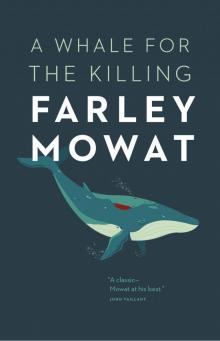 A Whale for the Killing
A Whale for the Killing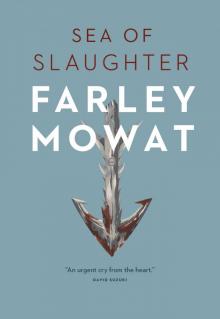 Sea of Slaughter
Sea of Slaughter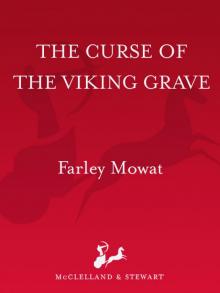 The Curse of the Viking Grave
The Curse of the Viking Grave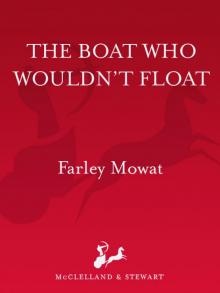 The Boat Who Wouldn't Float
The Boat Who Wouldn't Float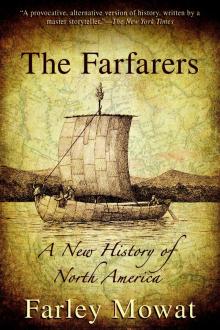 The Farfarers: Before the Norse
The Farfarers: Before the Norse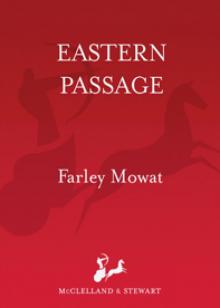 Memoir
Memoir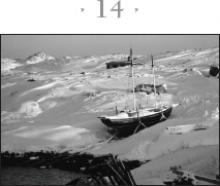 Bay of Spirits: A Love Story
Bay of Spirits: A Love Story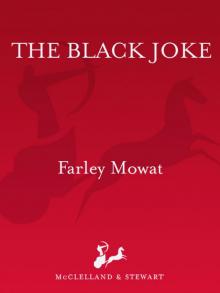 The Black Joke
The Black Joke Sibir: My Discovery of Siberia
Sibir: My Discovery of Siberia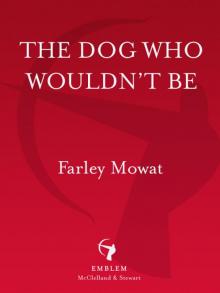 The Dog Who Wouldn't Be
The Dog Who Wouldn't Be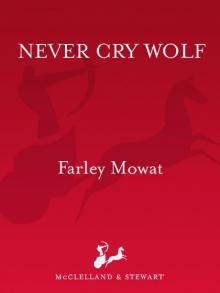 Never Cry Wolf
Never Cry Wolf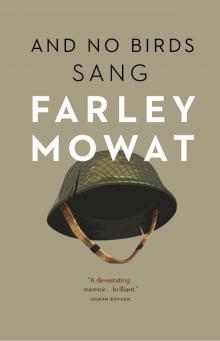 And No Birds Sang
And No Birds Sang The Snow Walker
The Snow Walker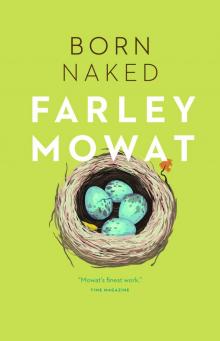 Born Naked: The Early Adventures of the Author of Never Cry Wolf
Born Naked: The Early Adventures of the Author of Never Cry Wolf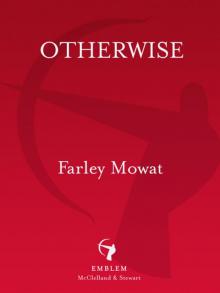 Otherwise
Otherwise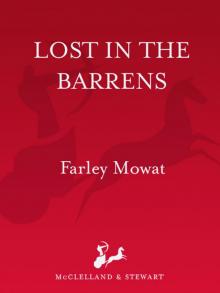 Lost in the Barrens
Lost in the Barrens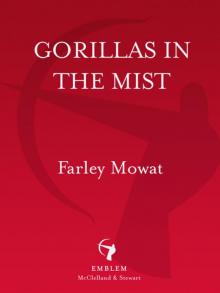 Gorillas in the Mist
Gorillas in the Mist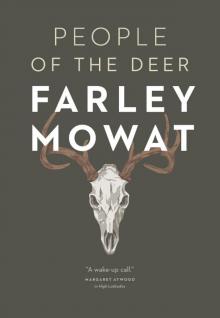 People of the Deer
People of the Deer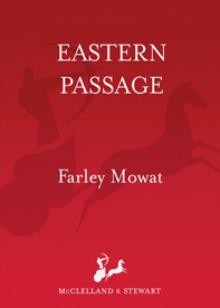 Eastern Passage
Eastern Passage Sibir
Sibir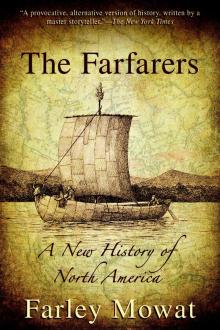 The Farfarers
The Farfarers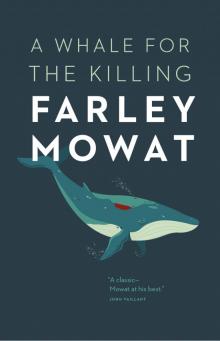 A Whale For The Killing (v5.0)
A Whale For The Killing (v5.0)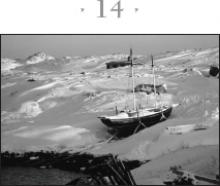 Bay of Spirits
Bay of Spirits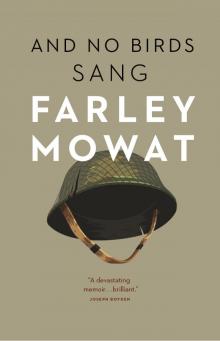 And No Birds Sang (v5.0)
And No Birds Sang (v5.0)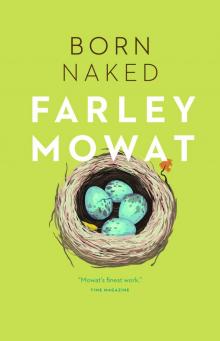 Born Naked
Born Naked